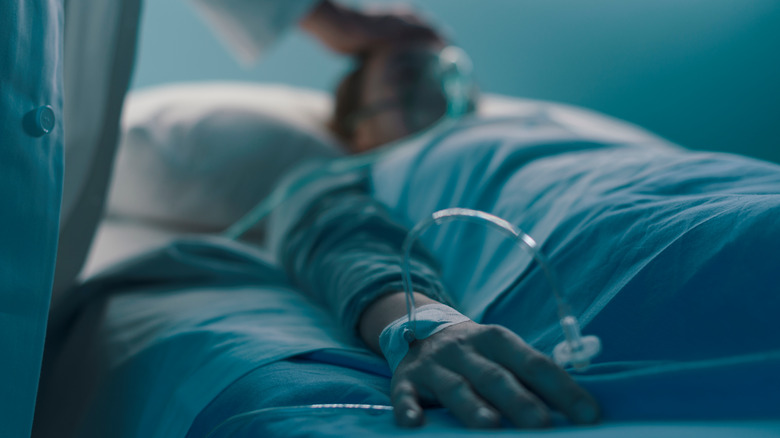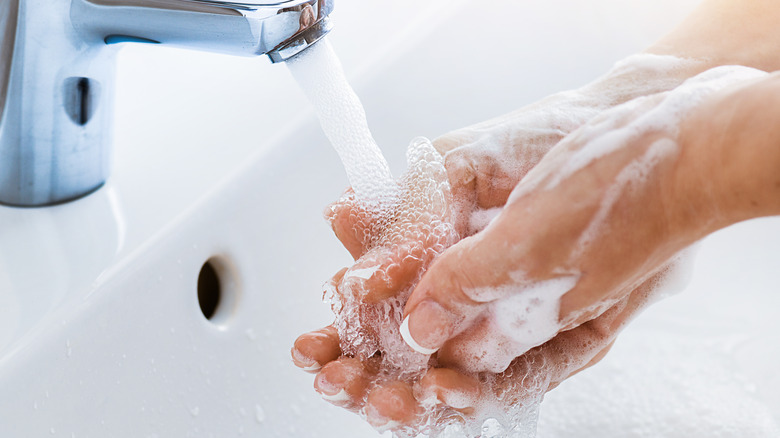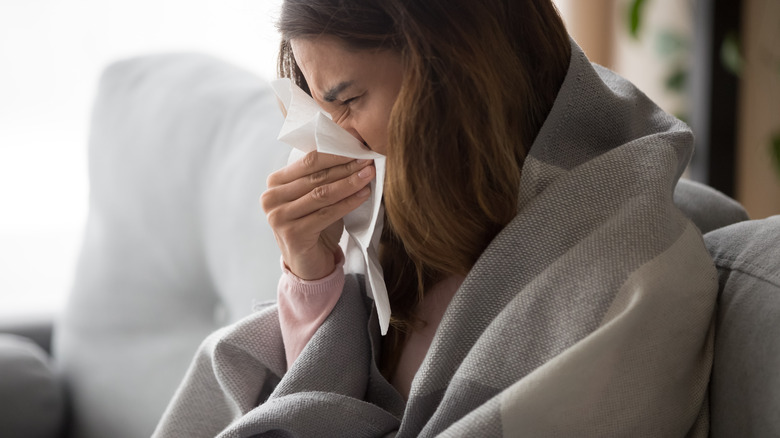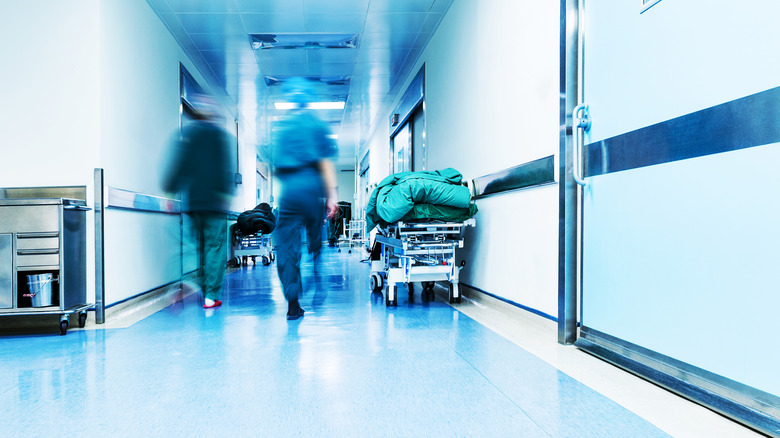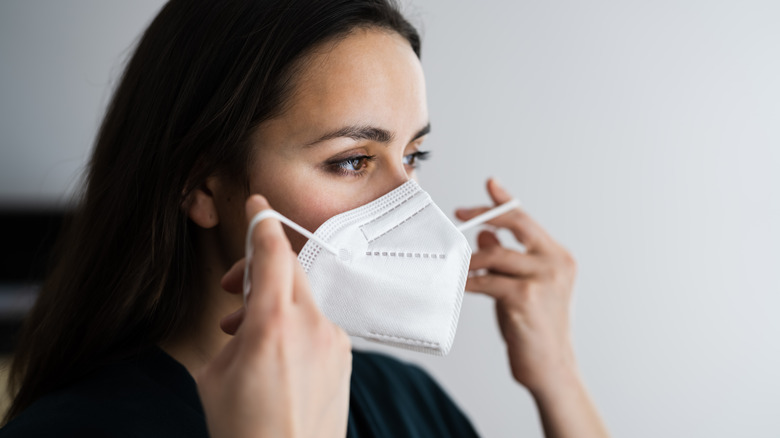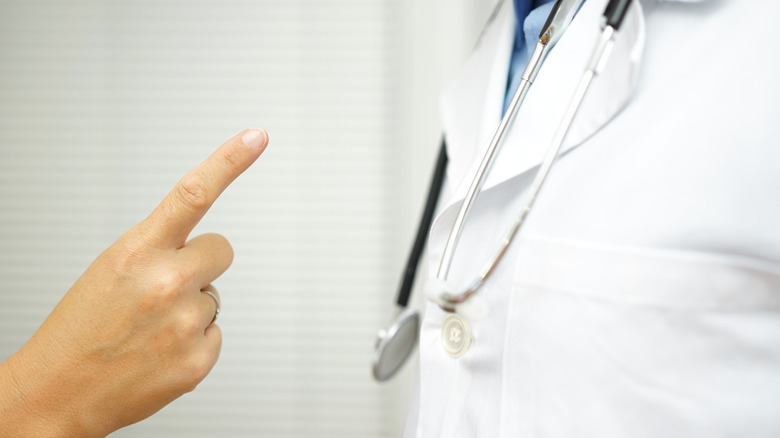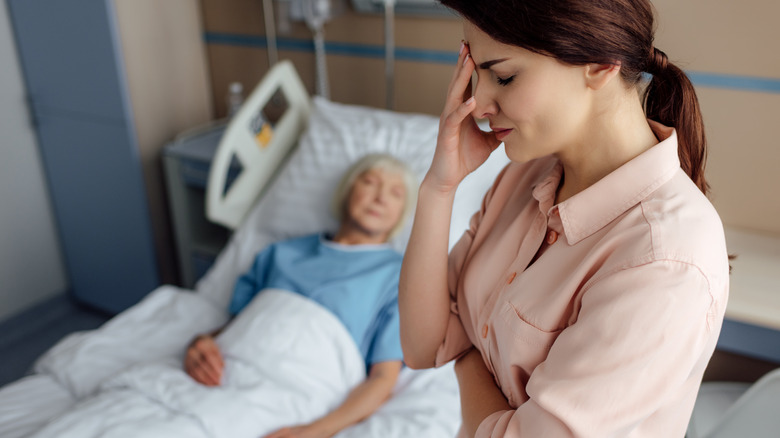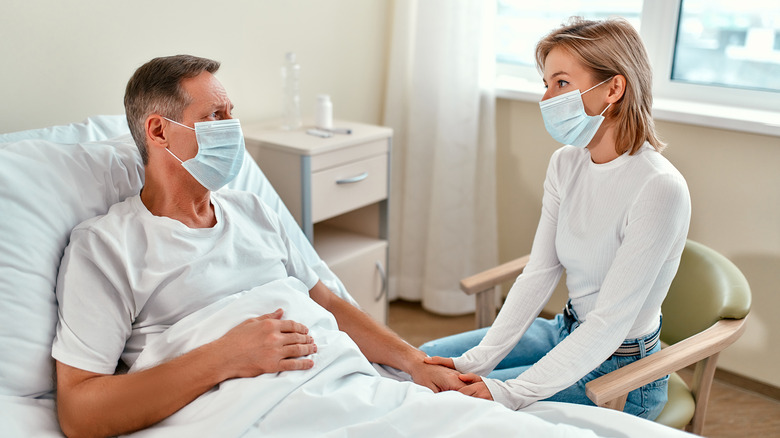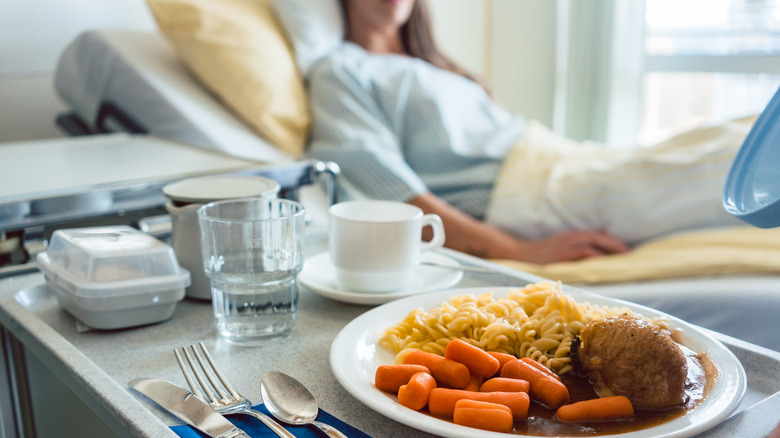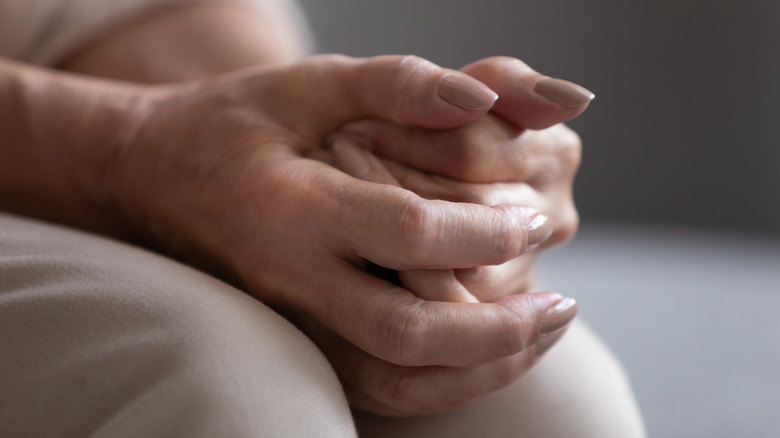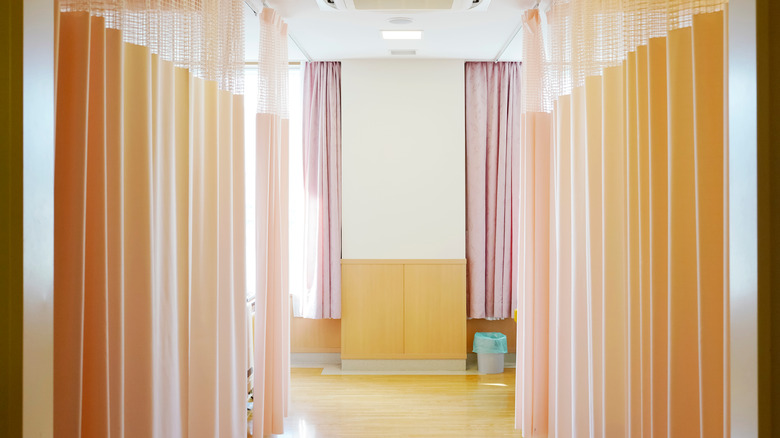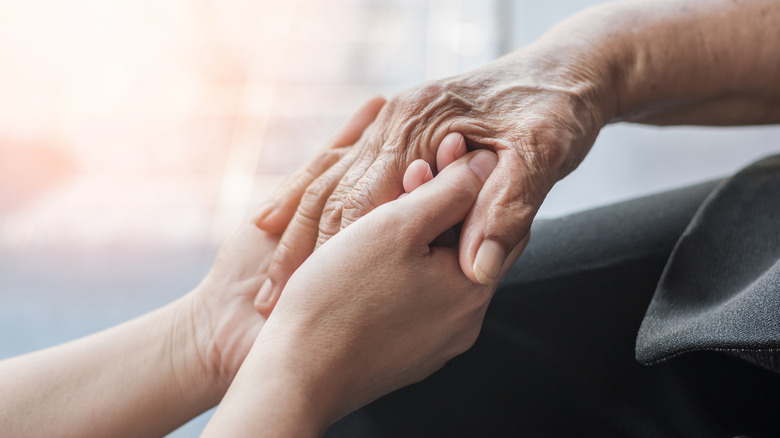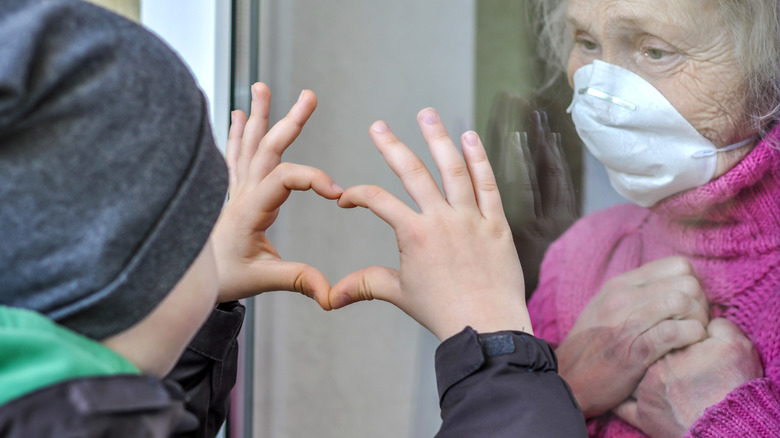Things You Should Never Do When Visiting Someone In The Hospital
When a loved one is hospitalized, you may want to visit them. In many cases, hospital visitors are an important part of the healing process. According to Clinical Correlations, "A substantial body of research has identified positive patient outcomes related to open visitation policies, including rapid recovery times and decreased length of stay." Not only can you provide emotional support while visiting, you can also ensure that the patient's needs are being met. Johns Hopkins Medicine explains that while everyone should have a personal health advocate, only about 70% of individuals actually do.
While visiting someone in the hospital, be mindful not to make their situation (or yours) even worse. For instance, you may unknowingly expose your loved one to germs, or cause them additional stress and anxiety. You can also raise your own risk of exposure to a wide range of contagious diseases, or experience emotional trauma from seeing someone you care about in such a vulnerable position.
Keep in mind that the pandemic has impacted hospital visitor policies, so check on current restrictions before heading over. When you arrive, you will probably be asked to wear a mask at all times, along with showing proof of COVID-19 vaccination or a negative test result. Many hospitals, including the University of California San Francisco, are limiting in-patient visitor hours and the number of visitors allowed at this time. To ensure your loved one's safe recovery, here are some things you should never do when visiting someone in the hospital.
Neglect to wash or sanitize your hands
When visiting the hospital, one of the most important things you can do to protect your loved one is to wash your hands. Proper handwashing with soap removes potentially dangerous germs, prevents illness, and even saves lives (via the CDC). Germs are passed on when people frequently touch their eyes, nose, and mouth, through foods and drinks, and from touching objects with unwashed hands.
Healthline provides seven steps to washing your hands properly. First, wet your hands with clean (ideally running) water, then apply enough soap to cover your entire hands and wrists. Afterwards, lather and rub your hands together well, scrubbing the surfaces of your hands, fingertips, fingernails, and wrists thoroughly. Do this for at least 20 seconds, then rinse under clean (ideally running) water. Use a clean towel to dry your hands and wrists (or air-dry them), then turn off the faucet using a towel.
If soap and running water are unavailable, you can use an alcohol-based hand sanitizer. Dr. Melinda Ring, executive director at the Osher Center for Integrative Medicine at Northwestern Medicine, describes how to use it. "Apply the product to the palm of one hand, using the label-recommended amount, and rub the product all over the surfaces of your hands until your hands are dry." Make sure to wait until your hands are completely dry and avoid wiping them on a towel or your pants.
Arrive sick when visiting someone in the hospital
If you have cold or flu-like symptoms or have recently been around someone sick, please stay home and far away from hospitalized patients. Additionally, the CDC strongly discourages individuals from visiting patients who are at increased risk for severe illness from COVID-19.
To prevent spreading illness, it may be helpful to familiarize yourself with how some common diseases are transmitted. For example, according to the Mayo Clinic, a cold virus enters the body through the mouth, eyes, or nose. It can spread through droplets in the air when someone coughs, sneezes, or talks, or by sharing contaminated objects such as eating utensils, towels, or phones.
Not surprisingly, the spread of COVID-19 to vulnerable populations (including hospital patients) is of grave concern. The World Health Organization (WHO) explains how COVID-19 is transmitted: "Current evidence suggests that the virus spreads mainly between people who are in close contact with each other, for example at a conversational distance. The virus can spread from an infected person's mouth or nose in small liquid particles when they cough, sneeze, speak, sing or breathe. Another person can then contract the virus when infectious particles that pass through the air are inhaled at short range (this is often called short-range aerosol or short-range airborne transmission) or if infectious particles come into direct contact with the eyes, nose, or mouth (droplet transmission)."
Bring certain items without checking first
When visiting the hospital, you may wish to bring gifts such as flowers or balloons. While we certainly understand the sentiment, we recommend checking with hospital staff beforehand. Many hospitals have restrictions on allowable gifts to help reduce hospital acquired infections and other safety threats (per Advisory Board). These restrictions can vary based on the hospital, unit, and even the patient.
Fresh or dried flowers and plants, for instance, can harbor mold and be dangerous for immunocompromised patients. Psychiatric patients, on the other hand, may use strings from gifted balloons as a means for self-harm. Also, if you bring comfort items from home like blankets and pillows, remember to wash them first (and afterwards, so that you don't introduce hospital germs into your home). And you should never provide hospital patients with banned substances, including alcohol, drugs, and cigarettes.
If you'd like to supplement those oh-so-delicious hospital meals with some outside food, the Mayo Clinic advises that you ask the doctor, nurse, or dietician first. This is because some patients may be at increased risk of infection from bacteria in uncooked foods, in danger of receiving certain excess nutrients or allergens, or need to follow a restricted diet for other reasons. If you do get the okay and decide to bring something prepared at home, be sure to maintain proper hand hygiene and follow safe food handling guidelines. Then, bring single serving items with you, so that safely storing leftovers isn't problematic.
Show up without permission
Here's the thing: Not all hospital patients are up for visitors. There are many potential reasons why this might be the case: They may be too tired, dealing with acute pain, concerned about outside contagions, wishing to talk to doctors and nurses privately, or feeling self-conscious about their appearance. When asking a patient permission to visit, Verywell Health suggests, "Ask them to be candid with you, and if they prefer you not visit, ask them if another day would be better, or if they would prefer you visit once they get home. Many patients love visitors, but some just don't feel up to it. Do the patient the courtesy of asking permission." If you are asked not to come, be sure to respect their wishes.
Even when someone in the hospital is eagerly looking forward to your visit, there may be certain times that would be preferred. According to Dignity Health, "Many hospitals allow visitors 24/7 access and suggest appropriate times to visit so that patients can get plenty of rest. Other hospitals limit visitation to set hours and rely on staff discretion to make exceptions to those rules." Generally, patients have the right to let anyone visit who they'd like to see; they are no longer restricted to visits from only direct family members. But unfortunately, as with so many things, pandemic safety measures have impacted hospital visitation policies. Before visiting, we recommend checking in with not only the patient, but also with hospital staff.
Remove your mask when in the hospital
Regardless of your vaccination status or local pandemic restrictions, please respect that face masks are still required in all health care settings, including the hospital (per the American Health Association).
Wearing a mask provides "a barrier to keep virus-containing particles from escaping an infected individual and landing on another person," according to Dr. Ron Waldman, professor of global health at the George Washington University Milken Institute School of Public Health (via AARP). Even if you believe you are healthy when visiting the hospital, you still need to wear a mask. It is possible to pass on contagious diseases when asymptomatic. Keep in mind that masks not only protect hospital patients and healthcare workers, they also protect you.
You may be wondering about changing guidelines on the best types of mask to wear. CNET reports that people should replace their cloth masks with disposable N95, KN95, and KF94 masks. Dr. Bob Lahita, director of the Institute for Autoimmune and Rheumatic Disease at St. Joseph Health, explains, "An N95 is the best, if you can get it." KN95 and KF94 masks are reasonable alternatives, assuming that they fit well and you wear them consistently. Since the rise of the highly contagious Omicron variant, one thing that has become very clear is this: "Whatever you do, don't rely on a fabric mask alone any more. They're good at protecting others from your respiratory droplets, but not at protecting you against theirs, even with a filter pocket."
Bring young children
Perhaps Verywell Health says it best: "Don't take young children to visit unless it's absolutely necessary." While there may be exceptions, young children should generally be left at home when visiting the hospital. The American Cancer Society explains that in-patient hospital visits can scare children. There may also be age restrictions for hospital visitors.
If you make the decision to visit the child's parent or someone else in the hospital, aim for a time when the patient is fully up for it and can help set the child's mind at ease. You may also want to think of an activity for the parent and child to work on together, to ensure that the child "sees the visit as a happy one." It can also be helpful to have someone available, perhaps a hospital staff member, to explain any scary-looking hospital equipment or procedures.
You may have safety concerns about bringing your child to the hospital during a pandemic. However, most health experts agree that hospital visits are generally safe during COVID-19 (per WebMD). During your visit, be mindful of proper mask use, wash your hands (and your child's hands) frequently, and practice social distancing when possible.
Be rude to hospital staff
Some hospital visitors aim to be advocates for the patient, which can be especially helpful when a patient is unable to speak up for themselves. However, you need to understand that this should never involve being rude, aggressive, or threatening towards nurses, doctors, and other hospital staff. The Healthy explains the instinct behind this unproductive behavior, "It can be emotional and stressful to see your loved one in pain or discomfort, but ganging up on doctors, nurses and aids is the wrong approach." They suggest calming down, controlling your anger, and giving staff a break to do their jobs.
The New York Times reported on a related study evaluating the behavior of a neonatal intensive care unit (NICU) team after rude remarks were made to them by an actor pretending to be a parent visitor. The study found that the insulted hospital staff became less effective in teamwork and communication, along with diagnostic and technical skills.
Of course, respect goes both ways. If you or the patient feels disrespected by a healthcare worker, Verywell Health has some suggestions. First, consider their intent. If you determine that they probably did not mean any harm, you can either let it go or discuss the incident in a non-confrontational manner. On the other hand, if you believe that you were intentionally insulted, it may benefit future interactions to call them out on it. You should document the details of the exchange and consider reporting it to management.
Become overly emotional
While it is certainly understandable that you may feel emotional when visiting someone in the hospital, it is important to not let your emotions overwhelm you in front of the patient. If this happens, they may feel the need to care for you, despite the situation. If you become overwhelmed during your visit, it may be a good idea to step out of the room until you can compose yourself.
The Cleveland Clinic shares ways to recognize signs of emotional stress, which can include worry, fear, anger, and sadness. Physical symptoms may include heaviness in your chest, headaches, shoulder, neck, or back pain, grinding your teeth, and sleeping more or less than usual. Emotional symptoms may involve being more emotional than usual, feeling overwhelmed or on edge, and having trouble keeping track of things or remembering. To better cope with emotional stress, try taking time to relax, practicing mindfulness, focusing on something else, journaling, and meditation.
"It is common to feel stress symptoms before or after a crisis," states the Substance Abuse and Mental Health Services Administration (SAMHSA). If you are experiencing any of the following warning signs for adults, we recommend seeking help as soon as possible: Crying spells or bursts of anger, eating difficulties, loss of interest in daily activities, headaches, stomach pains, fatigue, feelings of guilt, helplessness, or hopelessness, and avoiding family and friends.
Interrogate the patient when visiting
There is a right way and a wrong way to ask someone about their health. Unfortunately, this can vary from person to person. Some hospital patients may freely share a lot of details about their health problems, while others may be more private and prefer to talk about just about anything else.
When you decide to visit someone in the hospital, respect that they are a whole person and more than just their condition (per Healthline). Then, be authentic when conversing, listen holistically, and resist the urge to interrupt. You should also avoid over-empathizing, giving unsolicited advice, victim-blaming, and providing platitudes like "everything happens for a reason." According to an insightful interview with cancer survivor Letty Cottin Pogrebin on Today, some appropriate things to say could include "I'm sorry this happened to you," "I can't imagine what it's like," and "What are you feeling?"
While during a hospital visit may not seem like the right time, asking close family members about their health history can benefit your own health. MedlinePlus Magazine offers a list of important health questions to ask family members and gather information on any diseases or medical conditions that they have been diagnosed with. It may also be helpful to know some general background information, like what age they developed the issue(s), their ethnic background, where they were born, and whether they (or anyone else in the family) has ever been tested for genetic mutations.
Eat the patient's food
Before reaching for uneaten food on someone else's hospital tray, you should be aware that hospital staff may be tracking what the patient eats and doesn't eat. One reason for this is to monitor their food input vs output (per The Healthy). Hospital staff may also assume that because all of the food is being eaten, the patient is receiving adequate nutrition. Clearly, that is not the case if you're the one eating it.
And besides, why would you want to eat hospital food if you don't have to? Not only does hospital food have a longtime reputation for tasting bad, it can also be bad for you. With doctors expressing continued frustration that unhealthy hospital food undermines their dietary advice, many hospitals are trying to make improvements. According to HuffPost, "Across the country, medical centers are hiring executive chefs, working closely with nutritionists and dietitians, and striving to ensure that patients with a wide range of dietary needs and restrictions are getting not only the nourishment they need while in the hospital, but the information they need to keep from coming back." In some hospitals, patients can now order fresh, made-on-demand meals of their choice, as long as they're within the scope of their dietary plan. Even so, make sure to check with hospital staff before digging into any leftovers.
Question a person's faith or force prayer
Some people take enormous comfort in religion to get through tough times. That said, developing a serious health condition can also have the effect of challenging one's faith. Parkview Health explains that you should never question a patient's faith when visiting the hospital. "The patient is likely already trying to maintain his/her faith as much as possible. Don't question whether their level or devotion to their faith is adequate."
Farzad Nourian, a hospital chaplain with Advent Health, provides some advice on what to say (and not say) when wishing to pray with your loved one. To begin, she suggests always asking beforehand if you can pray with (or for) them. If they say no, it is important to respect their wishes. If they desire prayer, ask what they would like prayer for, and be sure to keep the prayers short.
Also, remember that there are many other ways to express heartfelt sentiments besides prayer (via Cake). Some ideas include, "I love you, and I've been thinking about how to help you work through this. I'm always here to talk" and "Let me know what I can do to make this situation any easier. I will do anything, and I mean it."
Not respect their privacy
There are many privacy concerns in the hospital. These can involve basic courtesies like knocking before entering or asking permission before touching someone. There may also be more complicated issues, such as visitors overhearing personal health information or taking patients' photos without their knowledge. While doctors and nurses are provided extensive training on these matters, most hospital visitors are not.
According to the CDC, "The Health Insurance Portability and Accountability Act of 1996 (HIPAA) is a federal law that required the creation of national standards to protect sensitive patient health information from being disclosed without the patient's consent or knowledge." If a hospital staff member arrives for examination while you are visiting, don't assume that you are welcome to stay and listen in. Instead, offer to step out of the room until they are done. (This can also help patients keep their private parts, well, private.)
Another privacy concern involves taking photos of patients without consent. While HIPAA law places restrictions on medical photography, Relias Media discusses how personal photography is very difficult to monitor in a healthcare setting. If a patient is unable to provide permission for a photo, it is probably best not to take it –– and definitely don't post it on social media. As a 2020 study in the European Journal of Translational Myology observes, "Patient-oriented care is for nurses a holistic science, of which the patient's privacy respect is an essential part." Remember this when you visit someone in the hospital.
Overstay your welcome
Your loved one is in the hospital because they aren't well, so make sure to let them get enough rest for a smooth recovery. As Better Health explains, "For patients, hospital is a place for treatment and recovery. Keep this in mind when planning your hospital visit. Before you leave home, check with the hospital to make sure the patient is well enough to see you."
Even at the best of times, hospitals can be difficult places to sleep due to noise, illness, vital checks, pain, blood tests, meals, and medications (per Harvard Health). Therefore, some hospitals limit visiting hours so that patients can sleep without the disruption of visitors. Others have adopted a more patient-centric approach that allows patients to decide who can visit them, and when (via Nursing Times).
When visiting someone in the hospital, you should never expect to be entertained, force conversation, or compare your own or other people's health problems to theirs. If the patient would like you to stay for more than just a brief visit, find a way to sit quietly with them. For example, you could read a book or do a crossword puzzle while they rest. Avoid turning on the TV (unless they ask) or having disruptive phone conversations in the room.
Assume that they don't want visitors
With all of the possible ways to be a lousy hospital visitor, you may be tempted to just stay home. If so, you should be aware of the positive impact of hospital visitors on patient outcomes. Clinical Correlations states that visitors have the ability to "boost morale, provide comfort and relief for patients in the otherwise cold and sterile environment of the hospital, and supplement the day-to-day care provided by hospital staff."
Of course, it's not always possible to visit a loved one in the hospital. In particular, the COVID-19 pandemic has led to countless traumatic scenarios where patients are separated from their loved ones (via Stat). If you have the option to visit someone in the hospital, remember to ask first if they would like you to come. Then, discuss a good time, make sure your visit is focused on the patient (and not on you!), and don't overstay your welcome. If you would like to bring a gift, ask hospital staff about any restrictions beforehand.

